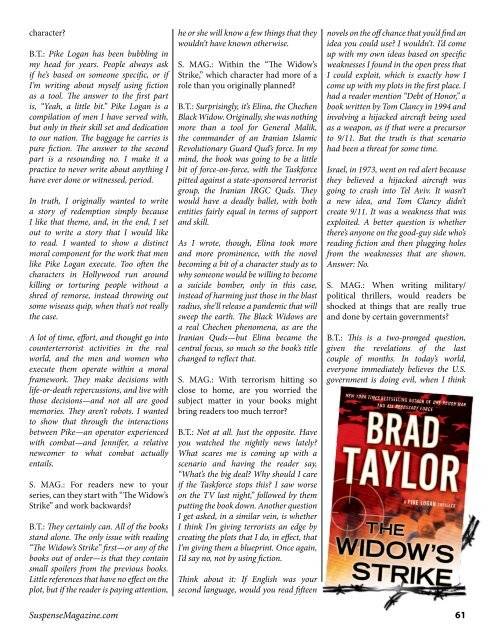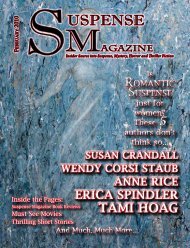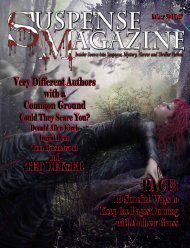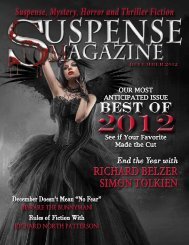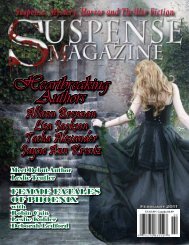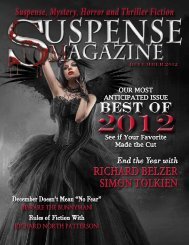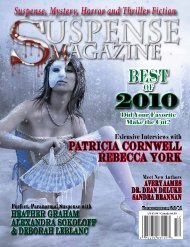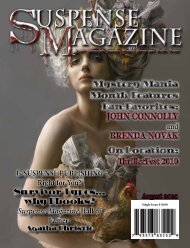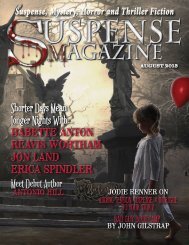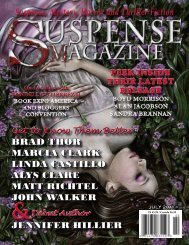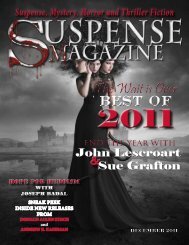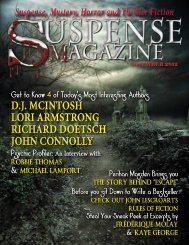Suspense Magazine July 2013
Suspense Magazine July 2013
Suspense Magazine July 2013
You also want an ePaper? Increase the reach of your titles
YUMPU automatically turns print PDFs into web optimized ePapers that Google loves.
character<br />
B.T.: Pike Logan has been bubbling in<br />
my head for years. People always ask<br />
if he’s based on someone specific, or if<br />
I’m writing about myself using fiction<br />
as a tool. The answer to the first part<br />
is, “Yeah, a little bit.” Pike Logan is a<br />
compilation of men I have served with,<br />
but only in their skill set and dedication<br />
to our nation. The baggage he carries is<br />
pure fiction. The answer to the second<br />
part is a resounding no. I make it a<br />
practice to never write about anything I<br />
have ever done or witnessed, period.<br />
In truth, I originally wanted to write<br />
a story of redemption simply because<br />
I like that theme, and, in the end, I set<br />
out to write a story that I would like<br />
to read. I wanted to show a distinct<br />
moral component for the work that men<br />
like Pike Logan execute. Too often the<br />
characters in Hollywood run around<br />
killing or torturing people without a<br />
shred of remorse, instead throwing out<br />
some wiseass quip, when that’s not really<br />
the case.<br />
A lot of time, effort, and thought go into<br />
counterterrorist activities in the real<br />
world, and the men and women who<br />
execute them operate within a moral<br />
framework. They make decisions with<br />
life-or-death repercussions, and live with<br />
those decisions—and not all are good<br />
memories. They aren’t robots. I wanted<br />
to show that through the interactions<br />
between Pike—an operator experienced<br />
with combat—and Jennifer, a relative<br />
newcomer to what combat actually<br />
entails.<br />
S. MAG.: For readers new to your<br />
series, can they start with “The Widow’s<br />
Strike” and work backwards<br />
B.T.: They certainly can. All of the books<br />
stand alone. The only issue with reading<br />
“The Widow’s Strike” first—or any of the<br />
books out of order—is that they contain<br />
small spoilers from the previous books.<br />
Little references that have no effect on the<br />
plot, but if the reader is paying attention,<br />
he or she will know a few things that they<br />
wouldn’t have known otherwise.<br />
S. MAG.: Within the “The Widow’s<br />
Strike,” which character had more of a<br />
role than you originally planned<br />
B.T.: Surprisingly, it’s Elina, the Chechen<br />
Black Widow. Originally, she was nothing<br />
more than a tool for General Malik,<br />
the commander of an Iranian Islamic<br />
Revolutionary Guard Qud’s force. In my<br />
mind, the book was going to be a little<br />
bit of force-on-force, with the Taskforce<br />
pitted against a state-sponsored terrorist<br />
group, the Iranian IRGC Quds. They<br />
would have a deadly ballet, with both<br />
entities fairly equal in terms of support<br />
and skill.<br />
As I wrote, though, Elina took more<br />
and more prominence, with the novel<br />
becoming a bit of a character study as to<br />
why someone would be willing to become<br />
a suicide bomber, only in this case,<br />
instead of harming just those in the blast<br />
radius, she’ll release a pandemic that will<br />
sweep the earth. The Black Widows are<br />
a real Chechen phenomena, as are the<br />
Iranian Quds—but Elina became the<br />
central focus, so much so the book’s title<br />
changed to reflect that.<br />
S. MAG.: With terrorism hitting so<br />
close to home, are you worried the<br />
subject matter in your books might<br />
bring readers too much terror<br />
B.T.: Not at all. Just the opposite. Have<br />
you watched the nightly news lately<br />
What scares me is coming up with a<br />
scenario and having the reader say,<br />
“What’s the big deal Why should I care<br />
if the Taskforce stops this I saw worse<br />
on the TV last night,” followed by them<br />
putting the book down. Another question<br />
I get asked, in a similar vein, is whether<br />
I think I’m giving terrorists an edge by<br />
creating the plots that I do, in effect, that<br />
I’m giving them a blueprint. Once again,<br />
I’d say no, not by using fiction.<br />
Think about it: If English was your<br />
second language, would you read fifteen<br />
novels on the off chance that you’d find an<br />
idea you could use I wouldn’t. I’d come<br />
up with my own ideas based on specific<br />
weaknesses I found in the open press that<br />
I could exploit, which is exactly how I<br />
come up with my plots in the first place. I<br />
had a reader mention “Debt of Honor,” a<br />
book written by Tom Clancy in 1994 and<br />
involving a hijacked aircraft being used<br />
as a weapon, as if that were a precursor<br />
to 9/11. But the truth is that scenario<br />
had been a threat for some time.<br />
Israel, in 1973, went on red alert because<br />
they believed a hijacked aircraft was<br />
going to crash into Tel Aviv. It wasn’t<br />
a new idea, and Tom Clancy didn’t<br />
create 9/11. It was a weakness that was<br />
exploited. A better question is whether<br />
there’s anyone on the good-guy side who’s<br />
reading fiction and then plugging holes<br />
from the weaknesses that are shown.<br />
Answer: No.<br />
S. MAG.: When writing military/<br />
political thrillers, would readers be<br />
shocked at things that are really true<br />
and done by certain governments<br />
B.T.: This is a two-pronged question,<br />
given the revelations of the last<br />
couple of months. In today’s world,<br />
everyone immediately believes the U.S.<br />
government is doing evil, when I think<br />
<strong>Suspense</strong><strong>Magazine</strong>.com<br />
61


